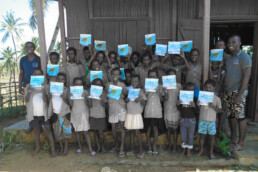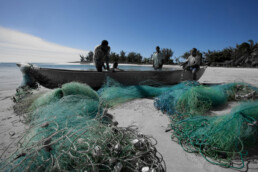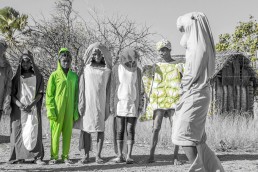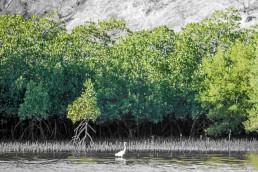E€OFISH
Sustainable Management of Small-Scale Fisheries
E€OFISH seeks to develop sustainable fisheries to bring positive change in the lives of fishers in the Eastern Africa, Southern Africa and Indian Ocean region. Funded by the European Union, this programme supports local, innovative and experimental initiatives that promote fisheries management best practices.
In an exciting 4-year project with E€OFISH, C3 Madagascar spearheads sustainable management of small-scale coastal fisheries in northern Madagascar. The key biodiversity areas are Bay of Rigny, Nosy Hara, and Ambodivahibe, covering an area of more than 300,000 hectares. This involves fisheries data collection, fisher capacity building for self-governance as well as monitoring, and ultimately locally-driven management plans including LMMAs. A total of 174,675 Ha of marine area will be protected by 2024.
From June 2020 to June 2024, C3 is working with fishing syndicates, local communities, fisheries management organizations, and marine protected areas to assess artisanal fisheries in the key areas. We identify opportunities for more effective monitoring and management; train local fishermen and existing structures on ecology, management of fisheries, and marine ecosystem; and implement management interventions, focusing on opportunities that will produce quick, measurable results.
For twelve months, C3 collected data at landing sites, including socio-economic surveys of households dependent on fishing.
Now, in consultation with community and local management structures, we are training 30 local investigators (fishermen) and 30 Junior Ecoguards in each area. Recognizing that youth, representing 50% of the population, are our future changemakers, a key component focuses on strengthening youth leadership via the Junior Ecoguard network with the Ministry of Education.
C3 engages fishermen’s unions and women’s associations in capacity building to develop a long-term community monitoring protocol. 300 local fishery guardians will be trained in the control and monitoring of marine protected areas. An equal number of men and women will become guardians. Their involvement increases the community’s motivation to actively manage LMMAs and a high awareness of fishing rules and regulations, thus guaranteeing their food security.
A further 150 wardens will be trained in patrolling and enforcement, while 150 more will be trained in ecology and marine ecosystems. Eliminating threats from migrant fishers strengthens ownership and control of coastal resources by the communities.
C3 strives for consensus on fisheries best practices and targets their implementation at the LMMAs. At each site, we will make available active management regimes and related data-informed policy documents. We share best practices resulting from the intervention and associated reports at the national level to facilitate replication. We also set up exchange visits by communities with the MIHARI network to share lessons learned with other LMMAs.
We continuously monitor the success of the program and its impact on fish stocks and catches. In the event of natural disasters such as cyclones and floods, C3 provides a safety margin for the recovery of habitats and fish stocks by LMMAs.
Our partners for this project include Tusk, European Union, E€OFISH, Indian Ocean Commission,Lake Tanganyika Authority, Lake Victoria Fisheries Organization, COMESA, EAC, Intergovernmental Authority on Development, IOTC, Southern African Development Community, SWIOFC, and Rising from the Depths.

Related Case Studies
Contact
C3 MadagascarLot II PA 12 Bis, Soavinimerina, Ambohimanga Rova, Antananarivo, Avaradrano
C3 Madagascar (CONSERVATION CENTREE SUR LA COMMUNAUTE C3 MADAGASCAR), in accordance with Article No. 5 of Ordinance No. 60133, is registered as a non-profit organization in Madagascar under the Direction of the Territorial Administration of Antananarivo with Registration No. 1206/14-MID/SG/DGAT/DIRAT/ANT/ASS.



